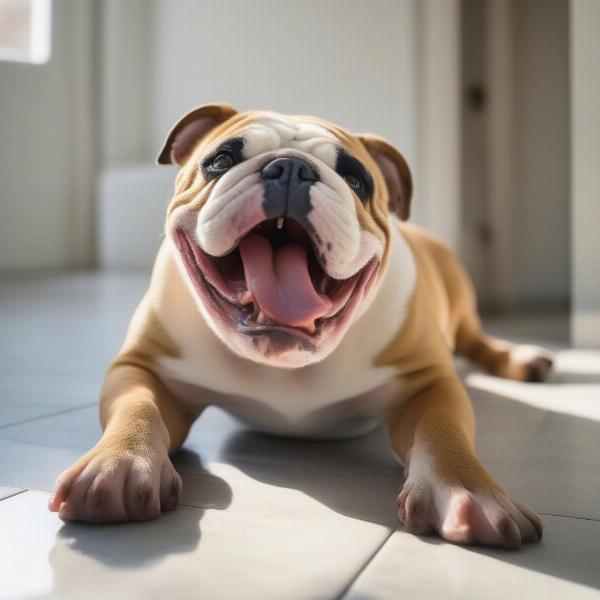Dog panting when resting can be perfectly normal, especially after exercise or on a hot day. However, excessive or sudden panting while at rest can sometimes signal an underlying health issue. Understanding the reasons why your dog pants when resting is crucial for ensuring their well-being. This article will delve into the various causes of resting panting in dogs, helping you differentiate between normal behavior and potential health concerns.
Why Do Dogs Pant When Resting?
Panting is a dog’s primary way of regulating their body temperature. They don’t sweat like humans, so panting allows them to evaporate moisture from their tongues and lungs, cooling them down. However, panting while resting can also be triggered by factors beyond temperature regulation.
Normal Reasons for Resting Panting
- Recent Exercise: If your dog has just finished playing fetch or going for a walk, panting while resting is expected as their body cools down.
- Heat: On hot days, even if your dog isn’t actively exercising, they might pant to stay cool. Ensure they have access to shade and plenty of fresh water.
- Stress or Anxiety: Panting can be a sign of stress or anxiety. New environments, loud noises, or separation anxiety can all trigger this response.
- Excitement: Sometimes, even positive excitement can cause a dog to pant. The anticipation of a treat or a favorite toy can trigger this reaction.
- Pain: While not always obvious, pain can sometimes manifest as increased panting, especially when resting. Observe your dog for other signs of discomfort.
Potential Health Concerns Related to Resting Panting
- Respiratory Issues: Conditions like pneumonia, bronchitis, or asthma can make breathing difficult, leading to increased panting even at rest.
- Heart Problems: Heart disease can impair the body’s ability to circulate oxygen efficiently, causing panting as the dog struggles to breathe.
- Cushing’s Disease: This hormonal disorder can cause increased thirst and panting.
- Anemia: Low red blood cell count can lead to reduced oxygen delivery to the tissues, triggering panting.
- Obesity: Overweight dogs have to work harder to breathe, which can result in increased panting, especially when relaxing.
 Dog panting due to heat
Dog panting due to heat
When to Worry About Your Dog Panting When Resting?
While occasional panting at rest is usually nothing to worry about, certain signs warrant a visit to the vet:
- Excessive or Rapid Panting: If your dog’s panting seems unusually rapid or heavy, even when cool and calm, seek veterinary advice.
- Changes in Breathing Pattern: Notice any wheezing, gasping, or labored breathing along with panting.
- Other Symptoms: If panting is accompanied by lethargy, loss of appetite, vomiting, or pale gums, it could indicate a serious health issue.
- Sudden Onset: If your dog suddenly starts panting excessively at rest without an apparent reason, it’s crucial to consult a vet immediately.
What to Do if Your Dog is Panting Excessively When Resting?
The first step is to try and identify the cause. Is it hot? Has your dog been exercising? If the panting seems excessive or is accompanied by other symptoms, contact your veterinarian immediately. Early diagnosis and treatment are crucial for managing any underlying health problems.
Conclusion
Dog panting when resting can be a normal physiological response or a sign of a more serious issue. By understanding the different reasons for panting and being aware of the warning signs, you can ensure your dog receives the appropriate care and attention they need. If you’re concerned about your dog’s panting, don’t hesitate to contact your veterinarian.
FAQ
-
Q: Is it normal for my dog to pant after a walk?
A: Yes, panting after exercise is a normal way for dogs to cool down. -
Q: When should I be concerned about my dog’s panting?
A: If the panting is excessive, rapid, or accompanied by other symptoms like lethargy or vomiting, consult your veterinarian. -
Q: Can anxiety cause panting in dogs?
A: Yes, stress and anxiety can trigger panting in dogs. -
Q: What health problems can cause panting in dogs?
A: Respiratory issues, heart problems, Cushing’s disease, and anemia can all cause increased panting. -
Q: What should I do if my dog is panting heavily and seems distressed?
A: Contact your veterinarian immediately. -
Q: How can I help my dog cool down if they are panting from heat?
A: Provide them with shade, fresh water, and a cool place to rest. -
Q: Is it normal for older dogs to pant more?
A: Older dogs may pant more due to age-related health changes. However, excessive panting should still be checked by a vet.
why do old dogs pant so much
how to stop a dog rolling in fox poo
lucky dog hot sauce
dog hot sauce
About ILM Dog
ILM Dog is your trusted international resource for expert dog care advice. We offer practical guidance on dog breeds, health, training, nutrition, grooming, and much more. Whether you’re a new dog owner or a seasoned expert, our articles are designed to help you provide the best possible care for your canine companion. For expert advice tailored to your specific needs, reach out to our team at [email protected] or call us at +44 20-3965-8624. ILM Dog is dedicated to helping you and your furry friend live a happy and healthy life together.